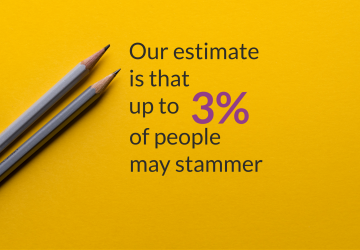
1% or 3%?
CEO Jane Powell asks the question: are there three times more people who stammer than we thought?
*Note: We have subsequently undertaken further polling to test these figures, please read our article How many adults stammer?, dated Feb 2022.*
Today we issued a press release and published an article 'Stammering in the population' which challenges a key statistic that the British Stammering Association has cited, year on year, that 1% of the adult population have a stammer.
When I applied for the job of CEO at the BSA I knew two people who stammered. In my excitement about the post, I pretty much told everyone that I was applying for it. This was when I found out I knew far more than just two people. My neighbour, the guy sat opposite me on the train for the last five years, and colleagues I’d known for decades. It turned out I knew upwards of a dozen people who stammered, and this was before I got the interview. What were the chances, eh?
Delighted to find people who could tell me more about stammering, I dug down. When did they start stammering, did they get therapy, did others know they stammered? These weren’t people who had the occasional stumble — their back stories were filled with how stammering had impacted them at school, first jobs, etc.
In 2018, looking at questions for the YouGov polling (see the press release), it was an obvious question to ask. “Do you stammer?” We preceded this with the definition of stammering, to make it clear what having a stammer means:
‘By "stammering or stuttering", we mean when someone struggles to get words out, often repeats or prolongs sounds or words, or gets stuck without any sound when talking. Sometimes this includes putting in extra sounds or words. This is different from the problems most people will commonly experience when talking (i.e. the occasional hesitation or stumbling around words).’
3% said that they stammered. Was this a blip? We repeated the question in a YouGov poll in December 2019. Again, 3% said that they stammered. In the 2019 poll, 58 people said they stammered (38 men, 20 women). Of those people, 41 said that they try to hide it.
It would be great to see similar polling across the rest of the world, and see if the 1% figure, that is cited so often, is accurate.
Is this significant? Potentially yes, as it would mean that over 1.5 million adults in Great Britain aged 16 or older identify as having a stammer, not 700K, as was previously thought. That figure doesn’t include children, the under 16s, in whom up to 8% will have a stammer at some point. Nor does the poll cover Northern Ireland, though I suspect the results would be similar.
What if it’s true? Stammering covers a spectrum. In the case of all those people I knew prior to working at the BSA, two people had an overt stammer. For the rest, some ‘hid’ their stammer and for others the stammer wasn’t very noticeable, but all identified as having a stammer.
It may be that many of those who identify as having a stammer don’t see it as a significant problem. It may be, but we need to find out. Sitting in a session with a group of covert stammerers the other day, who for the most part hadn’t heard of the BSA or Stamma, I was hit by how profoundly damaging having a covert stammer can be. And what brought them to the class was the fact that their covert stammer was having such a negative impact on their lives.
We need to find out more about this other ‘2%’ who self-identify; are they covert stammerers or are they at that far end of the spectrum where stammering doesn’t interfere with daily lives? If they identify as having a stammer, then how are we or how can we be, relevant to them as a charity? If we are successful in taking the stigma out of having a stammer, can we expect fewer people feeling the need to ‘hide their stammer’? It would be brilliant to see the percentage of people who hide their stammer drop in the years ahead.
Whether at school or at work, there may be over a million adults unwilling to publically present and address audiences, to apply for jobs requiring ‘good communication skills’. Not because they don’t have the words or knowledge, but because they can’t depend upon always saying the words. As a society and at work and in school, we’re missing out. Churchill stammered, some of our best poets, writers, actors, and thinkers stammer or stammered. We can’t afford not to hear everyone’s voice.
There are areas in the UK where there aren’t any speech and language services for adults, and in some places no services even for children. We are a charity dedicated to supporting people who stammer. Having a speech difficulty can be a profoundly disabling experience. We have to show that to the world, insist that support must be made available, that we should treat this condition like any other condition.
This poll shows that people feel the need to hide their stammer — and this shouldn’t be acceptable. Not in 2020. We need to hear people stammering. On the radio, on TV, on stage, in class and at work so that it’s no longer a novelty or punchline. Let’s acclimatise and desensitise the world to stammering, so that no child grows up feeling the need to hide how they talk and that every voice is heard.

































